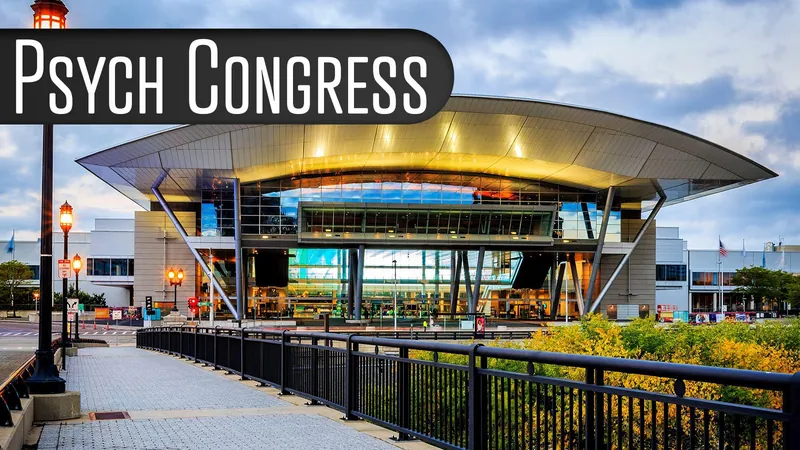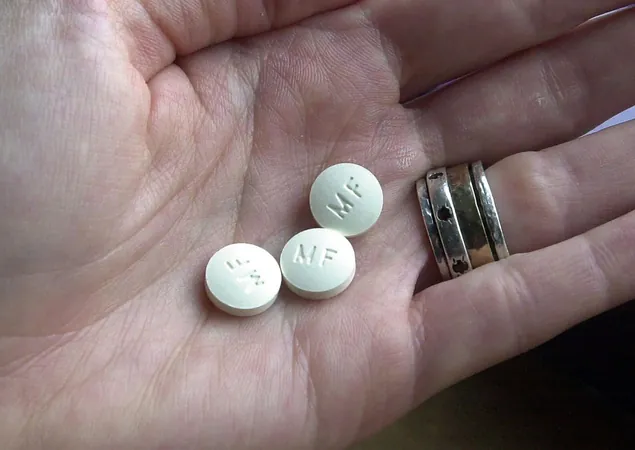
Groundbreaking Developments in Mental Health Treatment: Advances in Digital Therapies and Esketamine
2024-11-06
Author: Rajesh
Introduction
The recent Psych Congress meeting held in Boston unveiled a series of exciting and transformative research findings pertaining to mental health treatment, particularly focusing on major depressive disorder (MDD), esketamine therapy, and the vital role of physician assistants (PAs) in enhancing mental health access.
MIRAI Trial Results
One of the most significant findings came from the phase III MIRAI randomized trial involving 386 participants suffering from MDD who had not sufficiently responded to existing antidepressant medication. The trial evaluated the prescription digital therapeutic CT-152, also known as Rejoyn. Over six weeks, participants experienced an overall average reduction of 9.03 points in their Montgomery-Åsberg Depression Rating Scale (MADRS) score, marking a substantial improvement in their condition. Notably, while the results showed improvement compared to a placebo app, the difference wasn't statistically significant, leading to further exploration of CT-152's effectiveness.
Despite this, more participants using the CT-152 app reported significant improvements, with 48.3% showing either a partial or complete response as compared to just 37.5% from the control group. This innovative digital therapeutic recently received FDA approval, making it the first of its kind to be authorized as an adjunctive treatment for adult patients with MDD.
How CT-152 Works
CT-152 employs cognitive emotional training exercises aimed at enhancing emotional processing by specifically targeting brain regions like the amygdala and dorsolateral prefrontal cortex. Users are guided through cognitive exercises supplemented by brief lessons designed to bolster their mental health. The app is accessible on both iOS and Android platforms and, importantly, requires a prescription from a qualified healthcare provider.
Esketamine Treatment Environment
In addition to CT-152, a study also shed light on patient experiences during esketamine treatment, a drug approved for treatment-resistant depression and acute suicidal ideation. Conducted by Brittany Albright, MD, MPH, and William Rayburn, MD, MBA, the study revealed that the physical environment in which esketamine treatments occur can substantially influence patient comfort and perception of the treatment. Their investigation across various room types found that while patients appreciated customizable environmental conditions like ambiance and comfort, their choice of room did not significantly affect the incidence of adverse effects associated with the treatment.
Role of Physician Assistants
In a related focus on mental health workforce dynamics, an analysis indicated that over 90% of PAs within psychiatry actively screen, diagnose, and treat patients daily, underscoring their critical role in expanding access to mental health services. PAs not only provide essential care but also engage in telemedicine at a striking rate, with nearly 78% participating in virtual care compared to other specialties.
Conclusion
These developments spotlight the emerging landscape of mental health treatment – bringing hope and new possibilities to those struggling with depression and highlighting the essential contributions of professionals on the front lines of mental healthcare. The potential for technology and trained personnel to enhance patient outcomes could lead to a more comprehensive understanding and treatment of mental health conditions that afflict millions.




 Brasil (PT)
Brasil (PT)
 Canada (EN)
Canada (EN)
 Chile (ES)
Chile (ES)
 España (ES)
España (ES)
 France (FR)
France (FR)
 Hong Kong (EN)
Hong Kong (EN)
 Italia (IT)
Italia (IT)
 日本 (JA)
日本 (JA)
 Magyarország (HU)
Magyarország (HU)
 Norge (NO)
Norge (NO)
 Polska (PL)
Polska (PL)
 Schweiz (DE)
Schweiz (DE)
 Singapore (EN)
Singapore (EN)
 Sverige (SV)
Sverige (SV)
 Suomi (FI)
Suomi (FI)
 Türkiye (TR)
Türkiye (TR)